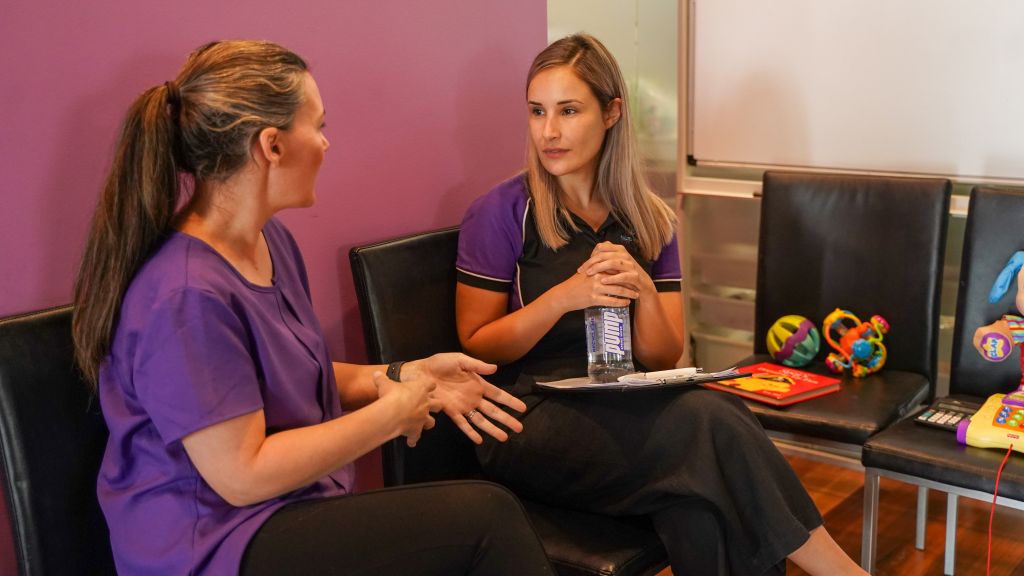Well it’s January again, and soon our children will be heading back to school – for some its their first time and for others its just another year. But it usually means they will have a new teacher, a new set of personalities and a new set of adventures ahead of them.
My 3 children will all be off to school this year and it got me thinking – what does my child’s teacher need to know about them? What should I tell them? So I started writing some ideas down that I have come across throughout my years as a school based therapist, but I also asked some teachers their perspective –
What information does your teacher need to know about your child?
I have come across 3 types of parents when it comes to information giving – They either:
1. Tell teachers everything including the foods they like and don’t like for dinner and also check in after school everyday to see how their child is going.
2. Tell them nothing, because they decided to let the teacher work out their child for themselves or don’t want their child labelled or don’t think its important.
3. A happy medium in the middle – they openly give information about their child but not ridiculous amounts – not a history starting with their favourite food when they were a baby!
So although I understand all 3 types of parenting and…. sometimes I cross between all 3 ….
Let’s aim for type 3 parenting!
This article will help you work out what’s important to tell your child’s teacher. Remember that even though your child may have been at the school last year, teachers don’t always pass on every bit of information – so if your child has special needs or considerations, a quick chat to their new teacher about their needs will always help. It also helps to build the rapport between you and the teacher and sets up a year of open communication.
Now I have come across a lot of parents that have said to me “I’m not telling the school my child has *insert diagnosis* because they will label them. I am going to wait until they work it out” … and, although I completely understand where you are coming from most teachers, in fact almost all teachers will use the information of ‘my child has *insert diagnosis*’ as a way to help them, guide them and make the classroom an appropriate learning space for them, they are not out to ignore or wipe their hands of your child because of a ‘word’, they want to help all children. If you decide not to tell the school about a diagnosis the teacher usually spends the first few weeks, if not months, trying to work out how to help your child and using trial and error methods to work out what is best – make their life easier and more importantly your child’s start to the year easier by arming the teacher with all the information they need to help your child.
There are reasons for telling and not telling certain information about your child –
Why would you tell the teacher about your child’s needs?
1. So they have context into your child’s life and background.
2. So they can provide the support they need
3. So they can let some things slide if it’s a particular area of need for your child.
4. So they can actually individualise their teaching. Yes, teachers do make specific alterations to their teaching to meet your child’s needs.
Why wouldn’t you tell the teacher things about your child
1. Your child does need to learn how to cope in this new environment, give them a chance to grow and see if their difficulties or quirks arise at school.
2. They are so much bigger than before, so what may have been an issue when they were 3 is maybe not an issue now!
Things not necessary to tell your teacher right away –

these probably go into the category of oversharing (unless the teacher asks about them or you can see it’s an issue)
1. Favourite colour – the child will tell them or show them, let them have things to tell their teacher.
2. Habits at home – school is so different let them start a fresh, the teacher doesn’t need to know they bicker with their siblings or similar.
3. A phase that they are in at the moment – let this be a phase and let them grow out of it, if it continues then address it with the teacher.
4. Issues they have randomly, but your gut says it may not be something that continues into school – this may be something you bring up after term 1 if you see it could be an issue in the classroom context.
5. What they were like as a baby – as cute as your stories are they are not necessary. As a side note though if your child had a significant illness or disease in early childhood, it may not be impacting their development now – but keep this in mind if your teacher asks you questions about your child’s development, sometimes things that happened early in life can impact on learning.
6. Rules you have at home that you want the teacher to do as well- unless your rule is for a reason listed above (in the ‘tell’ section), your child needs to learn the rules at school so let them learn.
So in summary talk to your child’s teacher, have open lines of communication from the start of the year – but don’t overwhelm them with information that is not necessary. An idea I was told to do for my child was to write down a list of the medical concerns he has and what we as a family are doing to help and give this to the teacher so the teacher can refer to it as needed.
Good luck to all children going back to school in a few weeks and a special good luck to those going to school with an extra hurdle an extra need that needs to be addressed.
They will all shine in their own way, keep them shining, don’t let them fade into the background of the teachers unknown.
Communicate with the school.
So what to tell and what not to tell!

1. Diagnosis – does your child have a diagnosis?
If they do, tell the teacher. Things like Autism, ODD, ADHD, Dyslexia, developmental delay etc. These are all diagnosis that will impact their learning or their social skills so tell the teacher how they can help and what you have found works best for your child.
2. Do they have vision problems?
If your child has had their eyes checked and there was a problem noted such as astigmatism, cataract, colour blindness, short sighted, longsighted etc. Tell the teacher. They may not need to make any changes to their teaching but they will note it down so if your child’s learning is being impacted on they have an information base.
3. Do they have hearing problems?
If your child has hearing problems (currently) teachers really need to know what it is so they can teach in a way your child can hear. It may be as simple as sitting at the front of the room or on their bad ears side (so their good ear is open to the classroom) Otherwise they will miss out on the opportunity to learn through verbal conversation.
4. Are you seeing a paediatrician to investigate anything?
If you don’t have a diagnosis yet but you are seeing a paediatrician for some reason, it’s always helpful to let your teacher know. The reason its important is because you are seeing the paediatrician for a reason (it may not be something that impacts on their learning but it may impact psychologically or socially) and changes in the classroom may be needed to help your child learn.
5. Does your child have a medical condition?
Does your child have allergies, asthma, or anything that may need medical intervention. Please tell their classroom teacher, even if you put it on their enrollment form, back it up with a quick conversation.
6. Does your child have toileting issues?
Some children have medical conditions or psychological reasons as to why they need alterations to the schools toileting policies – it could be they can’t hold on for any length of time so they need to be allowed to leave class when they ask to go, it could be that they need to use a single toilet rather than a toilet block due to a psychological event or fear. Please talk this through with your teacher as toileting is an important part of school.
7. Any significant trauma they have endured
This could be as extreme as witnessing violence, or as simple as you have moved homes in the past week. Deaths of family members may also effect children so if there has been a recent death that you think has impacted on your child’s persona or coping ability please let the teacher know. Trauma has significant effects on a child’s learning capacity unless handled well.
8. Has your child had any therapy before school or are they currently seeing a Speech Pathologist or OT or Psychologist?
If your child has had therapy or is currently seeing a therapist your teacher may ask for a report or even permission to contact the therapist. This is really helpful because if everyone who is helping your child is on the same page with goals and strategies, your child will strive and grow faster and with ease.
… and some less intense things to tell your child’s teacher:
9. Are they left handed?
It usually takes teachers about a term to work out who is left handed, who is right handed and who hasn’t decided yet. So give them a heads up so your child can have left handed scissors ready to go and can be positioned in the classroom appropriately.
10. If your child goes by a different name other than the one on their enrollment.
I have come across many children who have different names on their enrollment form to what they are called at home and in one example it took the child 2 terms to reaslise their teacher was talking to them when they said ‘Ahmad’ cause their parents always called him ‘Adam’ – please tell the teacher the correct name your child will respond to.

